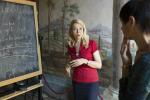
Kasia Rejzner
- Born inPoland
- Studied inPoland
- Lives inGreat Britain
Interview
Photo Copyright: Noel Tovia Matoff, www.matoff.de
This is an EXCERPT of the interview from the catalogue “Women of Mathematics Throughout Europe, a Gallery of Portraits”, published in Verlag am Fluss 2016, [email protected], and featured among thirteen portraits in the corresponding exhibition http://womeninmath.net. See also the EWM newsarticle.
We would like to thank Sylvie Paycha, Sara Azzali, Alexandra Antoniouk, Magdalena Georgescu, and Noel Tovia Matoff for allowing us to use the interview excerpts. Moreover, we acknowledge the work of Veronica Corona and Joana Grah for editing the interview excerpts.
Were you encouraged by your family, friends or by other people around you in choosing to do mathematics?
Both my parents are architects and they expected me to go into arts, following my artistic inclinations. They were very surprised to hear that I wanted to do maths and physics, but supported me in my choice, as they had always encouraged my natural curiosity. During the first years of my studies, my friends were in artistic circles and I still enjoy artistic activities very much. I see analogies between doing maths and art, which I also enjoy doing; in both you are confronted with a problem for which you need to work out a solution in an imaginative way. With time, my parents also realised that doing maths is a very creative activity and supported me all the more, as they had always wanted to stimulate my creativity.
Did you come across obstacles in pursuing your career as a mathematician?
There are obstacles that every mathematician meets; searching for a job after one’s PhD was a difficult time for me. During this job hunting process, women do not get much support from society, which in Poland, the country where I come from, is rather conservative. Women are not expected to set job-hunting around Europe as their primary goal at that stage in life, it should come only after building up a family and raising children. For this reason I still feel somewhat guilty/uncomfortable because of my life choices. I wish the atmosphere at Polish universities were more relaxed; I would not want to work in Polish academia, since I have heard that some “old school” professors still tend to look down on young women colleagues. Also, one is freer to pursue one’s own research interests and develop one’s own ideas in the UK and in Western Europe in general. Nevertheless, things are changing in Poland, so I do not exclude going back to my native country completely.
In retrospect, are you happy to have chosen mathematics or do you have some regrets? For you, what are the joys of mathematics? What are the hardships?
I am very happy to be doing mathematics, which is what I really wanted to do and I do not regret not choosing arts, which I still do as a hobby. I paint, do graphics and design, depending on my time constraints of course, but I still hold on to these hobbies. I like my job very much! Of course there are good and bad sides to it; it can be a very stressful job. (…) There are ups and downs in my job, moments of dark depression and others of exhilarating euphoria. Difficult times of doubts when you get stuck on a problem contrast with the good moments when you find the answer to a problem, a source of much joy and fulfilment. These ups and downs also may be part of my personality. The good sides of my job are the flexibility of our working hours, the freedom you have to choose the topics you work on, the exposure to new ideas it offers, the possibilities it gives you to meet very interesting people. I particularly enjoy the creative process we go through together when doing research with colleagues and friends.
What would you recommend to a young woman in your country wanting to start a career in mathematics?
When you start studying mathematics as a subject, you should start looking for opportunities to go abroad for at least a few months. Even though most of my country-fellow colleagues might want to go back to Poland later, having benefitted from some international experience is very important. But most important is not to let other people discourage you from doing mathematics. At school, both in Poland where I come from, and in England where I work, girls are sometimes told they are not expected to be “good at maths” since “maths is hard”. I think a slogan could be: “Mathematics is not hard, it’s just different!” It is a somewhat different way of thinking, that’s all! Another important advice is: “Don’t be afraid of being wrong!” Making a mistake should not be a reason for getting discouraged. You need to explore many things before finding a good idea. In mathematics, there is a clear cut between what is right or wrong, and it is easy to make a mistake, so do not fear making a mistake in front of your colleagues. Keep in mind that it is easier to be wrong than to be correct. You have to learn to defend your ideas and not feel personally attacked when they are criticised. This I found difficult when I started, but my PhD advisor told me I should not take it personally and use the criticism in a constructive way. (…) You need to develop a personal conviction that you “are a mathematician”, and that what you are doing makes sense. However, I feel the most difficult issue for women is the lack of permanent positions. Many women quit after their PhD, one of the reasons being that in our society it is less common for a man to follow his wife than conversely.
